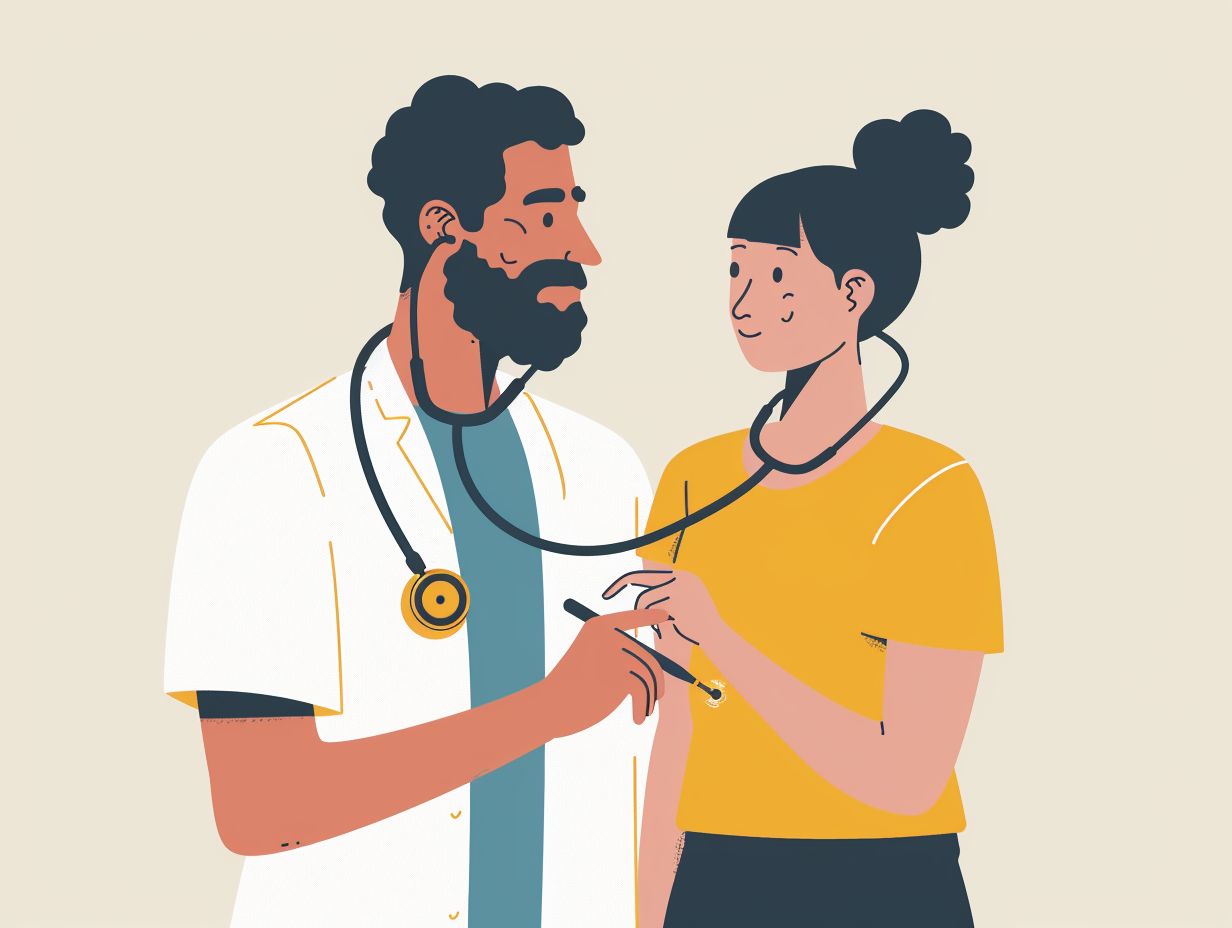
Medical Check Up
Have you ever wondered what happens during a medical check-up?
We will explore the importance of regular medical check-ups and why they are crucial for maintaining good health. From early detection of health issues to disease prevention, we will discuss the benefits of getting a medical check-up.
Learn about the tests included in a medical check-up and how often you should schedule one based on your age, gender, and personal health history. So, grab a cup of tea and let’s dive into the world of medical check-ups together!
Key Takeaways:

- Regular medical check-ups can help detect health issues early on, prevent diseases, monitor chronic conditions, and maintain good health.
- The frequency of medical check-ups depends on factors such as age, gender, family history, personal health history, occupation, and lifestyle.
- To prepare for a medical check-up, make a list of medications, bring previous medical records, wear comfortable clothing, and follow any fasting or pre-test instructions.
What Is A Medical Check-Up?
A medical check-up is an annual health assessment conducted by a doctor to evaluate a patient’s overall well-being and detect any underlying medical conditions.
Regular check-ups are crucial in maintaining good health as they allow healthcare professionals to monitor changes in key health indicators such as blood pressure, cholesterol levels, and blood sugar levels. Through screenings and tests performed during check-ups, early detection of diseases like cancer, diabetes, and heart conditions becomes possible.
Preventive care is a cornerstone of medical check-ups, enabling the identification of risk factors and lifestyle habits that could lead to health issues in the future. By staying proactive with routine screenings, individuals can address health concerns promptly and adopt necessary lifestyle modifications to prevent more serious conditions.
Why Is A Medical Check-Up Important?
Regular medical check-ups are crucial for early detection of health issues, preventive care to avoid diseases, monitoring chronic conditions, and maintaining good overall health.
Early detection through routine medical examinations can significantly increase the chances of successful treatment outcomes, as many conditions are more manageable when diagnosed early.
Regular check-ups also play a vital role in preventing serious illnesses by allowing healthcare providers to address risk factors before they escalate. These preventive measures can include lifestyle recommendations, screenings, and vaccinations tailored to individual needs.
Consistent monitoring during follow-up visits helps in tracking progress, adjusting treatment plans, and ensuring that any potential health concerns are promptly addressed. Through a proactive approach to healthcare, individuals can actively participate in their well-being and enjoy a higher quality of life.”
-
Early Detection of Health Issues:
Early detection of health issues like cancer and diabetes through regular medical exams can significantly increase treatment success rates and improve patient outcomes.
Regular screenings and medical tests play a crucial role in catching these diseases in their early stages when they are most treatable. For cancer, screenings such as mammograms, Pap smears, and colonoscopies can help spot abnormalities before they develop into full-blown tumors.
Similarly, routine blood tests and HbA1c measurements are instrumental in monitoring diabetes and preventing complications. Early detection not only enables prompt intervention but also reduces the need for aggressive treatments and improves survival rates significantly.
-
Prevention of Diseases:
Preventive measures such as vaccinations, cholesterol screenings, and regular immunizations during medical check-ups play a vital role in reducing the risk of various diseases.
Vaccinations are crucial as they help the body develop immunity against specific diseases, protecting individuals from potential infections. Cholesterol screenings aid in detecting levels of bad cholesterol, known as LDL, which if left unchecked, can lead to heart-related issues.
Regular immunizations, especially for children, ensure that they are shielded from preventable diseases like measles, mumps, and rubella. By prioritizing preventive care, individuals can significantly lower their chances of falling victim to serious health conditions.
-
Monitoring of Chronic Conditions:
Regular monitoring of chronic conditions like blood pressure, anemia, and dyslipidemia through medical check-ups helps in managing these conditions effectively and preventing complications.
Regular check-ups play a crucial role in early detection and intervention, enabling healthcare providers to adjust treatment plans to maintain stable levels and prevent exacerbations.
Laboratory screenings and tests are essential tools utilized during these check-ups to assess the progression of conditions like anemia and dyslipidemia. By tracking specific markers in the blood, such as hemoglobin levels for anemia or cholesterol levels for dyslipidemia, healthcare professionals can monitor the effectiveness of treatments and make necessary adjustments.
These check-ups provide an opportunity for patients to discuss any new symptoms or concerns with their healthcare team, fostering better communication and personalized care. In the long run, consistent monitoring can help individuals with chronic conditions lead healthier and more fulfilling lives.
-
Maintaining Good Health:
Medical check-ups are essential for maintaining good health by addressing mental health concerns, providing counseling on lifestyle changes, and promoting regular exercise routines.
Regular medical check-ups serve as a crucial aspect of preventive healthcare, offering a comprehensive evaluation of one’s overall well-being. Through these check-ups, healthcare professionals can detect early signs of mental health issues and provide necessary interventions to improve cognitive and emotional wellness.
During these consultations, individuals receive valuable guidance on adopting healthy lifestyle choices including nutrition, stress management, and sleep hygiene.
This holistic approach not only fosters physical health but also contributes to mental well-being by addressing the interconnectedness of body and mind.
What Tests Are Included in a Medical Check-Up?

A comprehensive medical check-up typically includes physical examinations, blood tests, urine tests, imaging tests, as well as specialized assessments like skin evaluations, vaccination updates, vision and hearing screenings, and oral health evaluations.
Plus these vital assessments, a medical check-up may also involve cardiac tests to evaluate heart health, such as electrocardiograms (ECGs) or stress tests. During the check-up, the healthcare provider may also conduct lung function tests to assess respiratory health and recommend further pulmonary evaluations if necessary. Assessments for chronic conditions like diabetes or hypertension might include blood pressure monitoring and blood sugar tests.
-
Physical Examination:
The physical examination during a medical check-up assesses BMI, skin health, vital signs like blood pressure and heart rate, and overall physical well-being.
Body Mass Index (BMI) calculation involves assessing a person’s weight in relation to their height, providing an indication of potential obesity or underweight issues.
Skin conditions are observed for any abnormalities such as rashes, lesions, or discoloration, which could hint at underlying health concerns.
Vital signs, such as blood pressure, heart rate, temperature, and respiratory rate, offer insights into cardiovascular function, metabolic rate, and general well-being.
A comprehensive evaluation of these components helps healthcare professionals to gauge a person’s health status and identify potential risks or areas for improvement.
-
Blood Tests:
Blood tests during a medical check-up help in assessing cholesterol levels, detecting diabetes, screening for HIV, and evaluating lead exposure, providing valuable insights into the patient’s overall health.
Cholesterol levels can indicate the risk of heart disease, while diabetes screenings are crucial for early intervention to manage blood sugar levels effectively. HIV screenings are essential for timely treatment and prevention of transmission, safeguarding both individual health and public health. Lead exposure evaluations are vital, especially in children, to prevent cognitive and developmental issues.
The data obtained from these blood tests forms a critical part of a comprehensive health assessment, guiding healthcare providers in creating tailored treatment plans and promoting overall well-being.
-
Urine Tests:
Urine tests conducted as part of a medical check-up help in detecting conditions like anemia, providing valuable insights into the patient’s kidney function and overall health status.
One of the key indicators that urine tests can reveal is the presence of blood in the urine, which could be a sign of underlying health issues such as kidney stones or urinary tract infections. By analyzing the levels of proteins, glucose, and electrolytes in the urine, healthcare providers can gain crucial information about the functioning of the kidneys and identify potential kidney diseases at an early stage.
-
Imaging Tests:
Imaging tests such as X-rays, CT scans, and MRIs are often included in medical check-ups to diagnose conditions like cancer and provide detailed insights into the patient’s internal health.
These imaging techniques play a crucial role in modern medicine by enabling healthcare professionals to visualize the body’s internal structures with high precision. X-rays are commonly used to capture images of bones and detect any abnormalities such as fractures or tumors. On the other hand, CT scans are powerful tools that create detailed cross-sectional images of the body, allowing for a more comprehensive analysis of organs and tissues.
MRIs are particularly useful in diagnosing soft tissue injuries or abnormalities, providing detailed information on organs like the brain, heart, and joints. By combining these imaging modalities, physicians can accurately diagnose conditions like cancer at early stages, leading to timely intervention and better prognosis.
-
Other Specialized Tests:
Medical check-ups may also include specialized tests such as developmental screenings for infants, adherence to vaccination schedules, and counseling on preventive care and healthy lifestyle choices.
These specialized tests play a crucial role in ensuring the overall well-being of individuals, starting from the early stages of life.
- Developmental screenings help healthcare providers detect any potential delays or issues in a child’s physical or cognitive development, allowing for early intervention and support.
- Adherence to vaccination schedules is essential to protect individuals from various preventable diseases, contributing to community immunity and reducing the risk of outbreaks.
- Counseling on preventive care and lifestyle modifications enables patients to make informed choices that can positively impact their health long-term, fostering a culture of wellness and disease prevention.
How Often Should Someone Get a Medical Check-Up?
The frequency of medical check-ups depends on factors such as age, gender, family history of illnesses, and personal health history, with healthcare professionals recommending tailored schedules for each individual.
For instance, individuals with a family history of heart disease may need more frequent cardiac screenings, while those with a predisposition to certain cancers may require specialized tests at specific intervals.
Age plays a significant role in determining the frequency of check-ups as older individuals often need more regular monitoring for conditions like diabetes, hypertension, and osteoporosis.
Gender-specific health risks also influence the check-up frequency; for instance, women may need more frequent screenings for breast and cervical cancer, whereas men may require regular prostate exams.
-
Age and Gender:

Infants, children, and adolescents require more frequent medical check-ups due to their developmental stages and growth patterns, with specialized assessments tailored to their age and gender-specific needs.
For infants, these check-ups are crucial to monitor growth milestones, vaccination schedules, and early detection of any developmental delays or health concerns. Pediatricians play a vital role in conducting thorough examinations and providing guidance on nurturing a healthy foundation.
As children transition to various life stages, regular check-ups help track physical, emotional, and social developments. Gender-specific screenings such as pelvic exams for girls or testicular exams for boys become essential during adolescence to detect potential issues early.
-
Family History:
Individuals with a family history of conditions like diabetes or cancer may need more frequent screenings and medical check-ups to monitor their health status and detect potential genetic predispositions early.
Regular check-ups can help healthcare providers identify any warning signs or risk factors that may have a genetic link. By staying proactive, individuals can potentially prevent or better manage conditions that run in their families.
- For example, with a known family history of diabetes, individuals should focus on maintaining a healthy lifestyle, including regular exercise and a balanced diet rich in fiber and whole grains to reduce their risk.
- Similarly, individuals with a family history of cancer should consider more tailored screenings such as mammograms or colonoscopies at an earlier age to catch any abnormalities in their initial stages.
-
Personal Health History:
Personal health history, including past laboratory results, cholesterol levels, and diabetes status, plays a crucial role in determining the frequency and scope of medical check-ups for proactive health management.
By analyzing these vital markers, healthcare providers can craft customized check-up schedules that address individual needs and risks. For instance, individuals with a history of high cholesterol may require more frequent monitoring and targeted interventions to prevent cardiovascular complications.
Similarly, individuals with a family history of diabetes may benefit from earlier and more regular screenings to detect and manage the condition effectively. Utilizing past laboratory data allows healthcare professionals to identify trends, set benchmarks for improvement, and track progress over time, leading to personalized and effective healthcare recommendations.
-
Occupation and Lifestyle:
Occupation and lifestyle factors such as sedentary work environments or high-stress levels can impact health, necessitating regular screenings, health education, lifestyle modifications, and exercise routines as part of medical check-ups.
High-stress occupations like healthcare workers, emergency responders, or executives can lead to elevated blood pressure, increased risk of heart disease, and mental health issues due to prolonged exposure to pressure and demands.
Conversely, sedentary desk jobs can contribute to weight gain, musculoskeletal problems, and poor posture, highlighting the need for tailored health approaches to address these specific risks.
What Should Someone Do to Prepare for a Medical Check-Up?
To prepare for a medical check-up, individuals should make a list of current medications, bring along previous medical records, wear comfortable clothing, and follow any fasting or pre-test instructions provided by the healthcare provider.
Creating a medication list is crucial as it helps the healthcare provider understand the patient’s current health status more accurately.
Next, carrying previous medical records ensures a comprehensive overview of the individual’s medical history.
Opting for comfortable attire during the check-up can facilitate easy physical examinations and improve overall convenience.
Adhering to any fasting or pre-test guidelines is essential to ensure accurate test results. It is beneficial to inform the healthcare provider about any ongoing medical conditions or recent health changes.
-
Make a List of Current Medications:
Creating a detailed list of current medications, including prescription drugs, over-the-counter supplements, and recent vaccinations, is essential to ensure accurate healthcare assessments during a medical check-up.
Regularly updating this information is crucial in preventing potential drug interactions, allergic reactions, or duplications of medications, all of which can significantly impact one’s health outcomes.
Having a clear record of vaccination history enables healthcare providers to recommend necessary booster shots or identify any gaps in immunization protection, especially important for vulnerable populations.
Documenting counseling sessions and mental health treatments supports a holistic approach to care, aiding in understanding patients’ emotional well-being and treatment compliance.
-
Bring Previous Medical Records:
Bringing previous medical records, especially laboratory screenings for conditions like anemia or dyslipidemia, allows healthcare providers to track health trends and make informed decisions during the medical check-up.
These records serve as a valuable snapshot of a patient’s health history, providing crucial insights into potential risk factors and underlying conditions. For instance, analyzing past blood test results can help identify any abnormalities in hemoglobin levels due to anemia or irregular lipid profiles indicative of dyslipidemia.
By comparing current findings with historical data, healthcare professionals can tailor their evaluation and treatment strategies accordingly, ensuring personalized care and targeted interventions. Regular monitoring of these markers through follow-up tests also enables ongoing assessment of the effectiveness of prescribed therapies and lifestyle modifications.
-
Wear Comfortable Clothing:

Choosing comfortable clothing for a medical check-up ensures ease of access for skin evaluations, BMI measurements, and vision assessments, facilitating a comprehensive examination by healthcare professionals.
When patients wear loose-fitting garments that can be easily adjusted or removed, it simplifies the process of checking for any unusual moles, rashes, or skin discolorations that could indicate skin health issues.
Comfortable attire assists in swift and accurate BMI calculations, as tight clothing may skew the results. During vision screenings, wearing comfortable clothing reduces any discomfort or distractions, ensuring that eye tests are conducted efficiently for accurate results. Comfort is key in enhancing the overall effectiveness of medical evaluations.
-
Follow Any Fasting or Pre-Test Instructions:
Adhering to fasting or pre-test instructions, especially for assessments like blood pressure monitoring, is crucial for obtaining accurate results and ensuring the effectiveness of medical check-ups.
When individuals fail to comply with these guidelines, it can lead to misleading readings and potentially alter the course of medical decisions.
Fasting before specific tests helps in avoiding skewed results caused by external factors such as recent meals or caffeine consumption. Following pre-test instructions assists healthcare providers in making well-informed assessments and providing appropriate treatment plans.
Maintaining consistency in following these guidelines contributes to better overall health management and monitoring. Emphasizing these protocols is fundamental for a comprehensive and reliable healthcare evaluation.
Frequently Asked Questions:
1. What is a Medical Check Up?
A: A Medical Check Up is a routine examination done by a doctor to assess a person’s overall health and detect any potential health issues.
2. Why is it important to get a Medical Check Up?
A: Regular Medical Check Ups can help detect health problems early on, allowing for timely treatment and better health outcomes.
3. How often should I get a Medical Check Up?
A: It is recommended to get a Medical Check Up at least once a year, though the frequency may vary depending on age, gender, and medical history.
4. What can I expect during a Medical Check Up?
A: During a Medical Check Up, the doctor will perform a physical exam, check your vital signs, review your medical history, and order any necessary tests.
5. Do I need to fast before a Medical Check Up?
A: Some Medical Check Ups may require fasting beforehand, such as blood tests or cholesterol screenings. It is best to check with your doctor for specific instructions.
6. Can I request specific tests during my Medical Check Up?
A: Yes, you can discuss your concerns and request specific tests with your doctor during your Medical Check Up. They will determine if the requested tests are necessary and appropriate for your health.